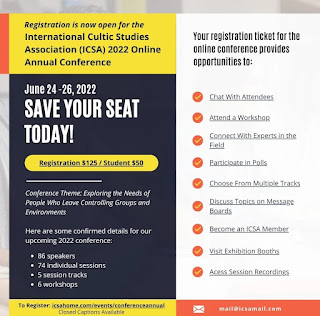
March 1, 2022
Mike Doughney, Friday, June 24th, 2022, 3:00 PM-3:50 PM
For over half a century, the Transcendental Meditation Program has enjoyed undeserved, positive pop-cultural visibility in the West, receiving endorsements from the famous and influential, recently including notables such as Oprah Winfrey, Ellen DeGeneres, Katy Perry, Tom Hanks and Michael J. Fox. How can this popular perception be successfully challenged?
Far from being a meditation method that’s misleadingly sold as “not a religion,” almost every element of the program, from its marketing, its initiation or instruction methods, and its advanced programs, are of a “religious nature,” fundamentally suspect, and are offered by an organization that isn’t trustworthy. Its internally toxic, cultish, sexist nature is well known among those formerly involved, who’ve experienced firsthand the practices and habits common among the movement’s lifelong devotees.
While claiming scientific authority and evidence to support itself, the TM organization exists in opposition to science and free inquiry. TM movement leadership enjoys a close relationship with fundamentalist, right-wing, Hindutva (Hindu supremacist) cultural and political movements and leaders in India, with which it shares aspects of doctrine and practice. Maharishi Mahesh Yogi created a movement that was designed to sustain, in India, a right-wing theocratic religious fundamentalist sect, while in the West soliciting the financial and cultural support of relatively irreligious, generally liberal people who may have avoided TM if these realities were fully disclosed to them upfront.
I’ll be discussing:
- What is, and isn’t, Maharishi’s Transcendental Meditation today?
- A brief history of the cycles of TM’s popularity?
- The TM movement’s efforts to manufacture a scientific facade for its practice, including creation of its own university?
- The historical sources of criticism of TM, which have had some influence on its popular perception?
- The elements of TM instruction that betray its clear religious origins and purpose?
- Methods for countering TM marketing efforts, online and in social media

Mike Doughney
Mike Doughney compiled an online resource critical of Transcendental Meditation, minet.org, almost thirty years ago. His personal involvement with TM started at the end of 1977, during which he assisted the Washington DC TM center with publicity and similar projects. Like many other meditators, he was not deeply involved with the organization, and he stopped meditating after a few years. After co-founding an Internet public access startup in the early 1990’s, he discovered an online community of former TM teachers, MIU students, and others who considered TM potentially harmful, and who believed the TM organization to be damaging and deceptive. Today, Mike writes for and co-coordinates the TM-Free Blog, a multi-contributor blog which focuses on critical and skeptical views of TM, its global organization, Maharishi Mahesh Yogi, and in recent years, the TM-supporting David Lynch Foundation. He’s gathered a substantial archive of materials produced by the TM movement, and others, in support of an ongoing effort to provide a reality-based counter-narrative to the marketing efforts promoting TM. A major focus of his writing is countering the movement’s leveraging of its devotees’ publications in scientific journals to insinuate TM into public schools and government in defiance of its unscientific nature.


